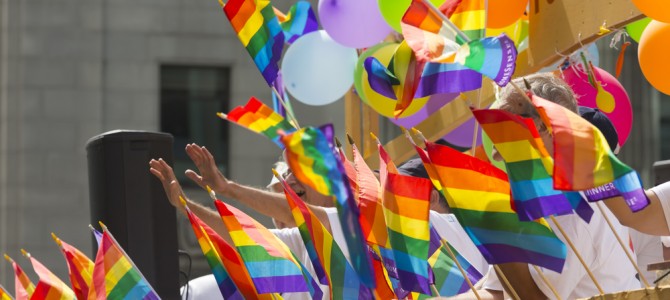
It’s due out any day now: the 2019 Corporate Equality Index published by the Human Rights Campaign, an LGBTQ advocacy group.
This will be the 17th edition of the index, a publication that purports to measure the degree of major corporations’ preferences for gay, lesbian, and transgender employees. In the 2018 edition, 609 businesses responded to HRC’s survey and earned 100 percent ratings based on their criteria, and were designated a “Best Place to Work for LGBTQ Equality,” earning recognition in that year’s report.
In addition, using publicly available information, HRC ranks all Fortune 500 companies. Last year, the average Fortune 500 company scored a 70 percent on their criteria. But what’s particularly interesting is the gap between survey participants (344) and others: the former had an index of 93, and the latter 13.
Companies Must Constantly Adapt to Stay Tolerated
What’s more, this index is remarkable in not merely measuring LGBTQ policies but at driving changes. Here’s how: the requirements needed to achieve a perfect score are communicated clearly ahead of time. They change periodically, with demands being ratcheted up. Not wanting to lose that perfect score, corporations change their policies in lockstep to meet those demands.
For example, to receive a perfect score in 2018, a corporation needed to only have fully equivalent same- and opposite-sex spousal benefits, although with the requirement that benefit booklets and the like clearly communicate that both classes are covered. However, for 2019, “to account for full family diversity” corporations must provide domestic partner benefits for both same- and opposite-sex domestic partners.
In 2018, corporations were required to offer coverage for sex-reassignment surgeries in at least one medical plan. In 2019, that requirement applies to all medical plans a company offers. And companies with pre-existing “supplier diversity” programs for minority vendors must now include LGBTQ diversity and “outreach to LGBTQ-owned businesses” in their program.
This isn’t the first time they’ve made changes. In 2016, they added requirements that corporations adopt sexual orientation and gender identity preferences globally and that corporations require their contractors to abide by the same policies. More significantly, they added a requirement prohibiting company philanthropic giving to non-religious organizations that have a written policy of considering sexual orientation or gender identity.
Yes, you guessed it, companies which donate to the Boy Scouts of America will lose their perfect score, because the BSA permits local chartering organizations to choose whether they believe it would be appropriate for gay or lesbian adults to be leaders in their troops, packs, and crews.
What’s more, have you noticed that TV ads are increasingly likely to feature same-sex couples, and corporations are increasingly likely to promote their support of LGBTQ causes? That’s in the criteria too––a “public commitment,” in which either “marketing or advertising to LGBTQ consumers (e.g., advertising with LGBTQ content, advertising in LGBTQ media or sponsoring LGBTQ organizations and events)” or “philanthropic support of at least one LGBTQ organization or event (e.g., financial, in-kind or pro bono support)” is required.
To prevent any repeat of the firestorm at Mozilla, their final criteria says that “employers will have 25 points deducted from their score for a large-scale official or public anti-LGBTQ blemish on their recent records.”
Norms Are Being Shifted Before Our Eyes
This sort of thing is very powerful. By setting a norm and getting buy-in from corporations that “good” companies follow that norm, they have gotten corporations to accept a restriction against making donations to the Boy Scouts, even if they otherwise might have, because their perfect score is more important, and to act with trepidation around any event that would be deemed a “blemish.” Really, the skillfulness of the whole endeavor is impressive, even if not the outcome.
And it’s just one of a growing number of ways in which activists are creating a norm for corporate and civic culture that extends beyond tolerance, and labels traditional Christian beliefs “bigotry.” When second lady Karen Pence’s employment at Immanuel Christian School, an evangelical school with a moral code for families and employees, was reported earlier this month, the outrage was swift. Even within the confines of a religious community, these beliefs were unacceptable.
The Twitter mob didn’t hesitate to condemn her and the school, with some accounts stating without hesitation that, however much Pence and the school might be given religious freedom by the Constitution, they would use their freedom of speech to target and ostracize anyone who holds those beliefs, in order to ban them from civil society every bit as much as white supremacists.
Last week, both The Federalist and Rod Dreher at The American Conservative reported that a Washington D.C. private school, Sheridan School, which plays in the same athletic league, announced that they would no longer play games hosted by Immanuel (it was unclear whether they were willing to forfeit the games or whether they expected to pressure the league into removing any potential penalties).
Watching these events play out, as well as a long list of others, it becomes harder and harder to envision that end result in which Christians are left to practice their religion in peace so long as civil marriage is opened up to same-sex couples. What happens next, I can’t even begin to guess.









